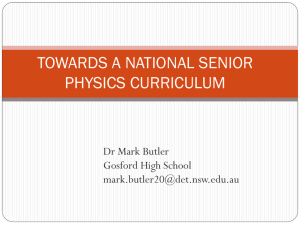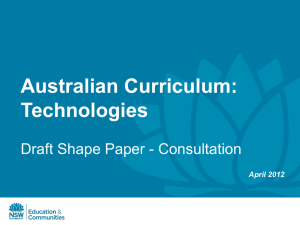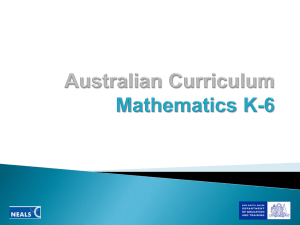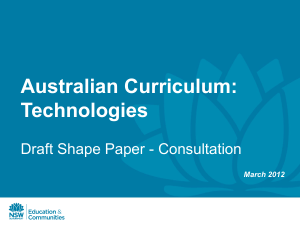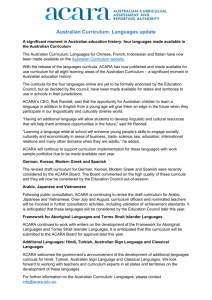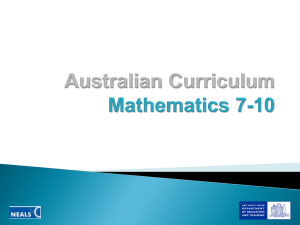Update on the Australian Curriculum
advertisement
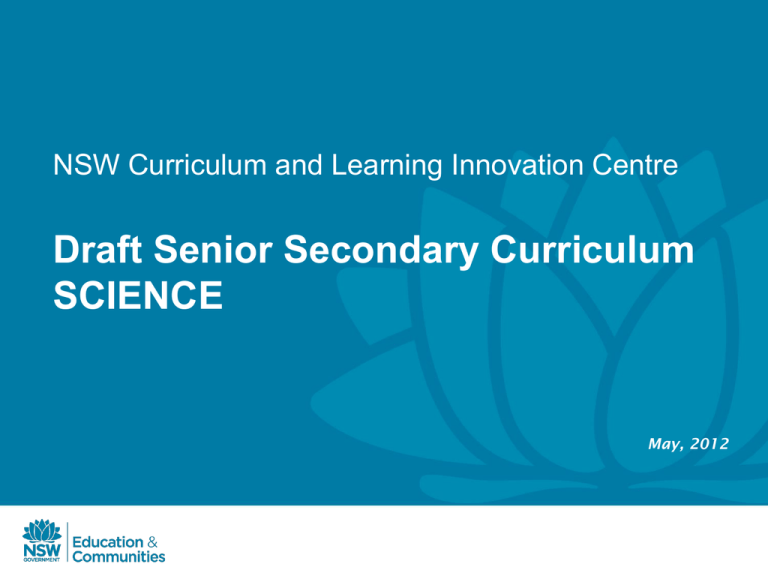
NSW Curriculum and Learning Innovation Centre Draft Senior Secondary Curriculum SCIENCE May, 2012 Overview of Senior Secondary Australian Curriculum • ACARA has developed draft senior secondary Australian Curriculum in the four learning areas of English, mathematics, science and history. • ACARA has specified content and achievement standards for different subjects within each learning area. • Curriculum, assessment and certification authorities in each state or territory (Board of Studies in NSW) are responsible for the structure and organisation of their senior secondary courses, as well as assessment and certification. Overview of Senior Secondary Australian Curriculum • Each subject has been divided into four units. • Each unit runs for about 50-60 hours, including assessment, i.e. one half-year semester per unit. • Units may be studied singly, in pairs (over a year) or as four units (over two years). • Each unit identifies particular learning outcomes for students and content descriptions that outline the teaching and learning included in the unit. Overview of Senior Secondary Australian Curriculum • Draft senior secondary subjects, including content and achievement standards, will be available for national consultation until 20 July 2012. • NSW has not yet committed to using the senior secondary Australian Curriculum for English, mathematics, science and history. • ACARA has said that current courses not covered by their proposed subjects, e.g. Extension courses, can still be offered by states. The consultation process Key considerations for consultation content achievement standards appropriateness, clarity and pitch volume and manageability of the curriculum The consultation process ACARA has invited national consultation on the draft senior secondary Australian Curriculum: Science until 20 July 2012. What is the draft curriculum structure? Four proposed senior secondary SCIENCE subjects Biology Chemistry Earth and Environmental Science Physics Curriculum structure • Senior subject (Biology, Chemistry, Earth and Environmental Science, Physics) Rationale Aims Unit description Learning Outcomes Content Achievement Standards Glossary Possible Inquiry Questions Biology This subject: •Develops the understanding of biological systems and the components of these systems, how matter flows and energy is transferred and transformed in these systems, the ways in which these systems are affected by change at different spatial and temporal scales. Each unit includes: •Unit descriptions •Learning outcomes •Content descriptions • Science Inquiry Skills (SIS) • Science Understanding (SU) and Science as a Human Endeavour (SHE) Unit structure of Biology Unit 1 Unit 2 Unit 3 Unit 4 • Biodiversity • Cells and multicellular organisms • Heredity and continuity of life • Surviving in a changing environment Chemistry This subject: • Develops the understanding of models of matter and energy transfers and transformations, the ways in which these models can be used to describe, explain and predict chemical structures, processes and systems. Each unit includes: • Unit descriptions • Learning outcomes • Content descriptions • Science Inquiry Skills (SIS) • Science Understanding (SU) and Science as a Human Endeavour (SHE) Unit structure of Chemistry Unit 1 Unit 2 Unit 3 Unit 4 • Structure, Properties and Reactions of Materials • Chemicals in the Environment • Chemical balance • Analysis and systems Earth and Environmental Science This subject: • Develops understanding of the Earth system model, the interactions between the Earth spheres and interaction between Earth processes, environments and resources are related within the Earth system. Each unit includes: • Unit descriptions • Learning outcomes • Content descriptions • Science Inquiry Skills (SIS) • Science Understanding (SU) and Science as a Human Endeavour (SHE) Unit structure of Earth and Environmental Science Unit 1 Unit 2 Unit 3 Unit 4 • Introduction to Earth systems • Earth processes- Energy transfers and transformation • Living on Earth- Extracting, using and managing Earth resources • The changing Earth- the cause and impact of Earth hazards Physics This subject: • Develop understanding of the core concepts, models and theories that describe, explain and predict physical phenomena. Each unit includes: • Unit descriptions • Learning outcomes • Content descriptions • Science Inquiry Skills (SIS) • Science Understanding (SU) and Science as a Human Endeavour (SHE) Unit structure of Physics Unit 1 Unit 2 Unit 3 Unit 4 •Models in thermal, nuclear and Electrical physics •Models of motion, waves, sound and light •From force to field models of gravity and electromagnetism •Current models of space-time, energy and matter Contribute to the consultation! • • • All Science teachers are encouraged to contribute to the consultation of the senior secondary curriculum for Science. You can do this as an individual or as a team. This is a good opportunity for you to shape the ACARA senior secondary English curriculum to work for you and your students, if it is adopted by NSW. To provide your feedback directly to ACARA, go to http://consultation.australiancurriculum.edu.au Contact Contact details available on the NSW Curriculum and Learning Innovation Centre website. http://clic.det.nsw.edu.au/aust_curriculum/contact.htm
